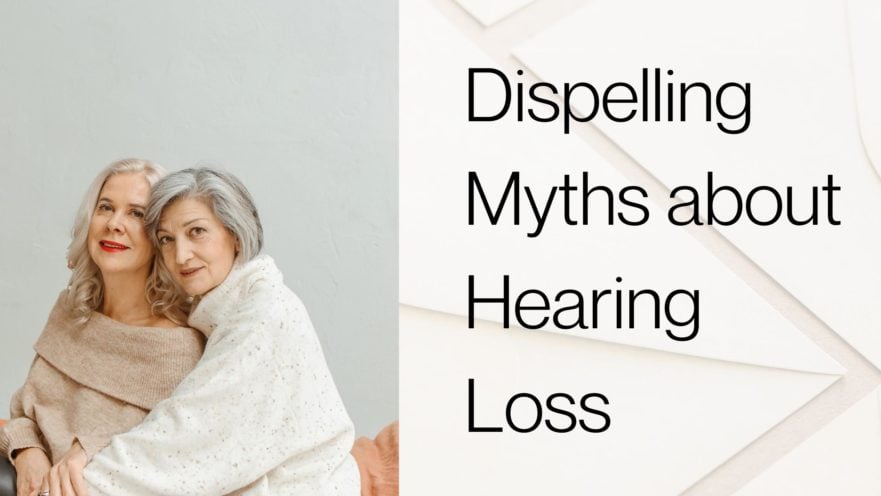Hearing loss is an invisible disability that affects about 14% of Americans. Still, many people are resistant to treating hearing loss due to old stigmas that have all but evaporated. With some of America’s best and brightest proudly sporting hearing aids to help them continue to live their lives, there’s no longer any good reason to avoid treating hearing loss.
Many of us may be carrying misconceptions about hearing loss, so let’s try to clear up a few of them and help inspire some thoughtful consideration about the reality of hearing loss.
Myth: Only Old People Have Hearing Loss
In reality, a full 40% of those with hearing loss are under age 60. While hearing loss does tend to become more problematic as we age over 60 or 70—and nearly 100% of centenarians have it—plenty of people who have hearing issues are well-below retirement age. The best thing we can do to keep ourselves fit, happy, independent and capable is to pursue treatment for our hearing loss as soon as we recognize that we have it.
Myth: Loud Noise Is the Cause of My Hearing Loss
It may be that some or, in some cases, the majority of your hearing loss was caused by going to loud rock concerts or riding motorcycles without hearing protection, there are many causes of hearing loss that can lead people to develop it even if they never experience a single unsafe sound level in their lives.
Scientists are learning that genetics plays a role in just about every kind of hearing loss, but modifiable risk factors include smoking, diabetes, certain medications, and diet. In fact, new studies have shown that close adherence to an anti-inflammatory diet—such as the Alternate Mediterranean Diet (AMED) or Dietary Approaches to Stop Hypertension (DASH)—can significantly reduce the risk of not only hearing loss but many cardiovascular issues. It’s even the case that drinking one or two alcoholic beverages, or chamomile tea, has otoprotective effects.
Myth: Other People Just Need to Talk Louder for Me to Hear
Actually, some voices will be harder to pick up than others. Children’s voices or those whose voices are naturally higher will usually be harder to understand. If people do talk louder, it may help to a degree, but shouting actually causes distortion in the ear, which then makes speech even less intelligible. Today’s hearing aids help a lot by reducing the level of background sound while simultaneously boosting speech, just at the frequencies you need. For some people, speech comprehension in complicated sonic environments can actually be better than normal when these hearing aids are worn.
Myth: I Should Wait to Get Hearing Aids Until My Hearing Is Worse
As you live with hearing loss, your brain gets used to it. In fact, when the auditory cortex is not stimulated by sound, it actually starts to atrophy. It’s not that the brain cells die, but the grey matter between them dissipates, allowing the structure of neurons to collapse. Over time, the ability to hear can be regained once you get hearing aids, but it’s not clear that the damage can be completely reversed. This also makes the process of adjusting to hearing aids much more difficult. The best approach is to start wearing hearing aids as soon as they are recommended by a hearing care professional.
Myth: Hearing Loss Gets Worse and Worse Until You Go Deaf
Hearing loss, for most people, progresses to a certain degree, and then plateaus. The place it plateaus is different for everyone, but most people can expect to retain some ability to hear. A set of hearing aids can be programmed to accommodate your changing hearing needs as they increase, in most cases.
Myth: Hearing Loss Is Annoying, But I Can Live With It
The effects of hearing loss come on so slowly that we often don’t realize that hearing loss was their original cause. In fact, even mild hearing loss causes significant fatigue, memory issues, and increased risk of accidental injury. It also doubles the likelihood that you will develop Alzheimer’s or dementia. For greater degrees of hearing loss, the troubles only increase. Untreated hearing loss can lead to depression, loneliness, social isolation, and a more sedentary lifestyle. For those with severe hearing loss, the risk of developing Alzheimer’s is increased fivefold.
Those who do get hearing aids not only avoid the worst outcomes, but also report a greater sense of optimism and confidence. They tend to lead more independent lives, while also appreciating improved social relationships. We really can think of treating our hearing loss as an important investment to make in ourselves.
If you or a loved one is living with untreated hearing loss, make an appointment for a hearing test today and find out what hearing aids can do to improve your life!


